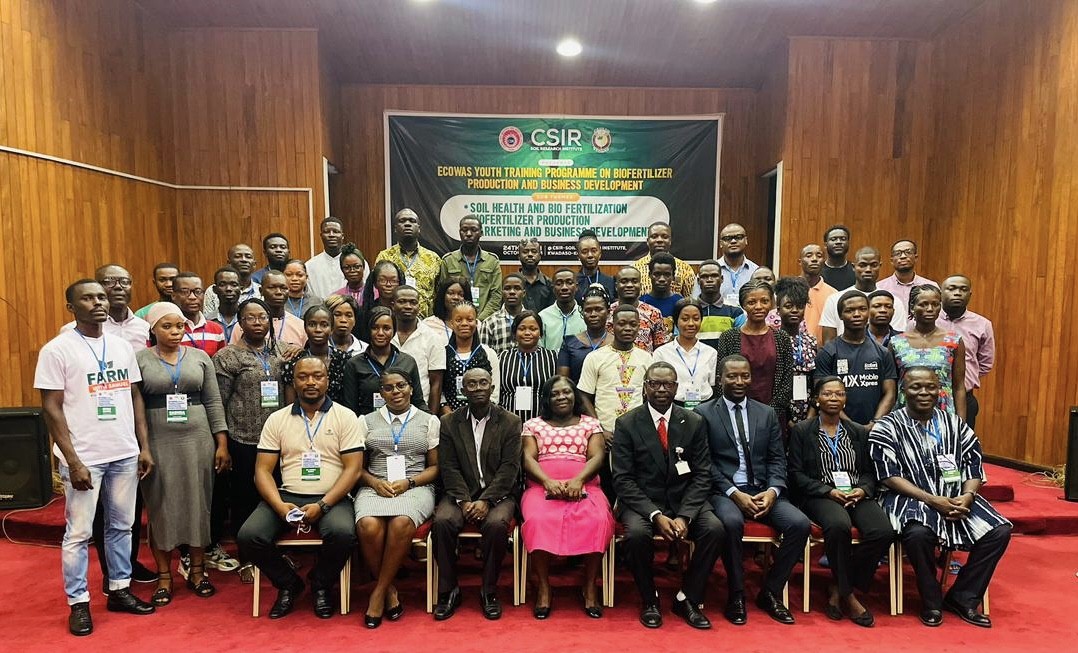The Council for Scientific and Industrial Research’s Soil Research Institute (CSIR-SRI) is taking significant steps to empower Ghanaian youth in bio-fertilizer production. This effort aims to address the country’s fertilizer gap, ensuring that Ghanaian farmers have access to critical agricultural resources.
Bio-fertilizers are a class of substances that contain living micro-organisms. When applied to seeds, plant surfaces, or soil, these micro-organisms colonize the interior of the plant, promoting growth and enhancing soil fertility. Dr. Edward Yeboah, Director of CSIR-SRI, emphasized the importance of harnessing available knowledge to drive economic transformation and reduce unemployment in Ghana.
Agriculture is a cornerstone of Ghana’s economy, and bio-fertilizer production holds significant promise in reducing fertilizer costs, increasing food production, and maximizing farmers’ profit margins. The three-day ECOWAS Youth Training on Bio-fertilizer Production and Business Development, held near Kumasi, presents an opportunity to train selected youth in bio-fertilizer production techniques.
Read also: Genser Energy boosts technical education in Ghana, donates gas turbine
Bio-fertilizers: A Key to Sustainable Agriculture
The training program, funded by the African Union Commission and supported by the government of Ghana, exposes participants to various aspects of bio-fertilizers. These include types, uses, concepts, compost production, biochar production technology, marketing bio-fertilizers as business ventures, and the development of carbon markets for smallholder farmers.
Moreover, participants will learn about the treatment of bio-fertilizers in Sawah eco-technology, a method for planting lowland rice in properly prepared soil to retain water for rice seedling growth. The training equips young participants with a comprehensive skill set and understanding of bio-fertilizer production.
CSIR-CRI’s Pest Management Technology revolutionises rice production in Ghana
Nurturing Entrepreneurship and Economic Transformation
Dr. Edward Yeboah, recognizing the challenges posed by climate change in recent times, emphasized the role of technologies in addressing these issues in agriculture. CSIR-SRI has been entrusted with the task of producing bio-fertilizers to promote sustainable food production in Ghana.
Additionally, Dr. Fuseini Issaka, a Research Scientist, discussed the participants’ transition from the training program into practical implementation. Participants will form groups and develop budgeted business plans to submit to ECOWAS. This step aims to support the youth in scaling up bio-fertilizer production to meet the country’s fertilizer needs.
One of the long-standing challenges in bio-fertilizer production has been the absence of proper branding, marketing, and connections to potential businesses within the fertilizer value chain. The training seeks to bridge these gaps by ensuring that young producers understand proper branding and marketing techniques, making their products more accessible and marketable.
As the training unfolds, it promises to empower Ghanaian youth to make a substantial impact in the agricultural sector, ultimately enhancing food production, reducing costs, and driving economic growth. The effort aligns with Ghana’s vision of leveraging agriculture as a catalyst for development and underlines the critical role of bio-fertilizers in achieving this goal.
















